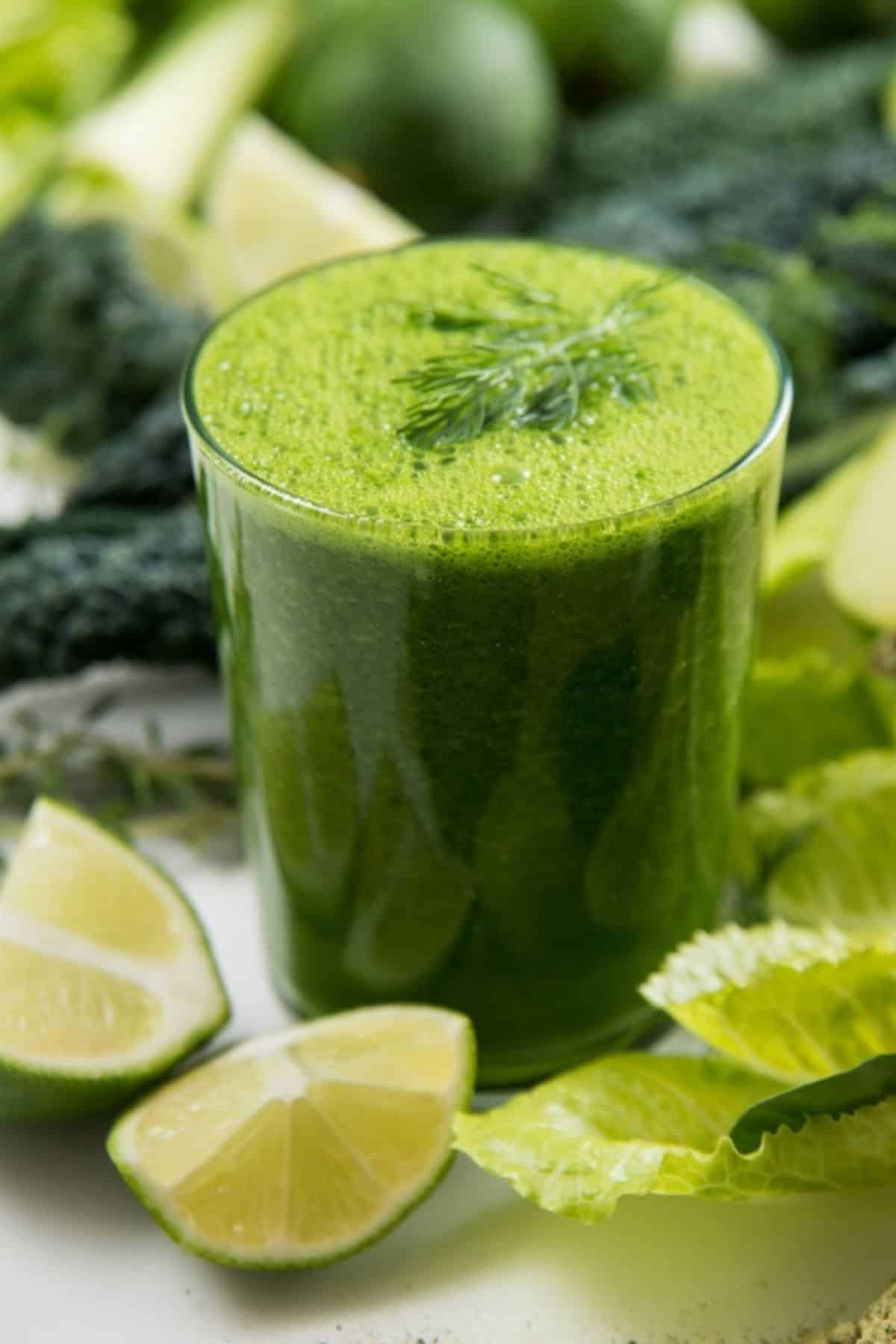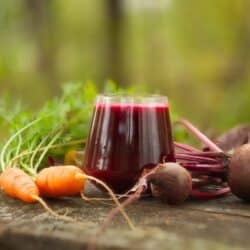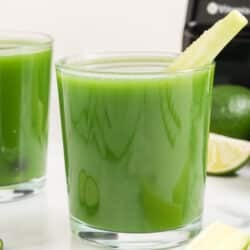9 Health Benefits of Kale Juice (Amazing!)
Kale Juice is a nutrient-dense green drink that has several potential health benefits. Learn the benefits of kale juice, why you should drink it, how much to drink, and any precautions about adding this juice to your diet.

Kale is a very healthy leafy green vegetables that is also one of the best cruciferous vegetables to include in your diet.
Whether you eat a kale salad, make a kale smoothie, or drink kale juice, you’ll get a variety of potential health benefits.
Let’s explore the top nine benefits of drinking kale juice!
Kale Juice Benefits
Brimming with essential vitamins, minerals, and antioxidants, kale juice is a nutrient-dense green juice drink that offers a remarkable range of health benefits.
1. Supports Detoxification
Kale juice helps the body eliminate toxins in several different ways.
First, its antioxidants and sulfur-containing compounds support the main detoxification organ in the body – the liver. They do this by helping convert toxic substances into harmless ones that the body can easily excrete.
As long as the juice isn’t finely strained, it will contain some fiber and pulp. This helps with the detoxification process, too, by keeping your digestive system in good shape and promoting regular bowel movements.
See my favorite Kale Juice recipe that you can make in a juicer or a blender. You can use either curly kale or dinosaur kale (or any of the different types of kale) for this recipe.
You can also see my full round-up of the Best Juice Recipes for Detox.
2. Improves the Heart Health
Kale and kale juice are loaded with nutrients important for your cardiovascular health.
Kale and its juice are high in potassium, an essential mineral that helps regulate your blood pressure by relaxing the walls of blood vessels.
Kale juice is great for keeping your cholesterol levels in check, too. That’s because it contains compounds called bile acid sequestrants, which reduce the amount of fat your body absorbs.
The result is that your levels of LDL (bad) cholesterol may decrease, while your levels of HDL (good) cholesterol may rise. In fact, at least one study has shown that drinking kale juice every day for 12 weeks can increase HDL levels by 27% and decrease LDL cholesterol by 10%!
Its vitamin K content is useful, too, helping control how much calcium is deposited in the arteries and reducing the risk of coronary heart disease.
Finally, kale juice helps keep you well hydrated, which is an important factor in reducing the thickness of your blood. This helps lower your blood pressure, decreasing the amount of strain on your heart.
See my full list of the best veggies to use in a juicer.
3. Boosts Your Immune System
Kale is a fantastic source of vitamin C, a powerful antioxidant that helps support the immune system.
This means that drinking kale juice regularly equips your body to fight off infections and diseases more effectively.
4. Promotes Healthier Skin
Many of the healthy benefits of kale juice take place “under the hood” – but some can even make a difference to your physical appearance!
The high vitamin C content of kale juice helps your body produce more collagen, an important protein that adds elasticity to your skin. Its antioxidants, meanwhile, protect against environmental pollutants that can cause premature aging.
Kale is also rich in beta-carotene, which the body converts to vitamin A – a vital nutrient for skin repair.
Working together, these valuable nutrients help keep your skin firm, reduce wrinkles, prevent dryness, and give you a naturally healthy glow.
5. Strengthens Your Bones
A surprising benefit of kale juice (and other dark leafy greens) is that it can boost the health of your bones.
That’s because it’s a good source of vitamin K, which helps your body absorb more calcium. This keeps your bones strong and may reduce the risk of fractures and osteoporosis.
Its potassium and magnesium content are useful, too.
Magnesium helps turn vitamin D into its active form which further boosts calcium absorption, while potassium improves bone density by neutralizing metabolic acids that can cause bone loss.
6. Helps You Manage Your Weight
If you’re working on controlling your weight, kale juice may be a great asset to your diet!
It’s low in calories but contains some fiber, so it helps you feel full and stops you from snacking between meals.
It helps keep you hydrated – effectively preventing those hunger pangs – and it is packed with nutrients that support a healthy metabolism.
These hydrating nutrients include potassium and magnesium – which have important roles in the process of converting food into energy – plus vitamins K and C.
7. Improves Digestion
When you juice kale you lose some of its fiber (which is why it’s important to consume it whole, too).
But if you retain some of the pulp, then a glass of kale juice still provides a relatively good amount of fiber, which adds bulk to your stools and keeps you regular.
Kale is pretty high in water, too, helping keep stools soft and preventing constipation.
Plus it contains antioxidants and other anti-inflammatory compounds like beta-carotene, vitamin C, and vitamin K.
8. Keeps Eyes Healthy
Another amazing benefit of drinking kale juice is that it can help you maintain good vision.
That’s because it contains two important nutrients – lutein and zeaxanthin. These carotenoids help protect the eyes from UV rays and are known to help prevent macular degeneration and cataracts.
Your body also converts the beta-carotene in kale to vitamin A, another important nutrient for eye health, particularly in low-light conditions.
Vitamin A protects the cornea, too, and a deficiency can lead to a progressive eye condition called xerophthalmia.
9. Reduces Inflammation
Last – but by no means least – drinking kale juice may have an anti-inflammatory effect on the body.
Kale juice is chock-full of nutrients that help bring inflammation under control, including omega-3 fatty acids, vitamin C, beta-carotene, and the flavonoid quercetin, all of which neutralize “free radicals” – the unstable molecules that cause oxidative stress.
What’s more, it’s a particularly good source of sulforaphane, a powerful anti-inflammatory that works by blocking the activation of the pathways in our cells that can lead to inflammation.
The sulforaphane in kale and foods like broccoli sprouts make these foods among the healthiest foods you can consume!
How Much Kale Juice to Drink?
There are no official recommendations for how much kale juice you can drink, but I recommend starting with 4-ounce (1/2 cup) serving each day.
While this is ideal for most people, the optimal amount depends on a few different factors, including your health goals and your personal tolerance.
It’s also important to include kale and other green leafy vegetables in your diet in its whole form, too, as this is a richer source of fiber than juicing. But, some people find that drinking juice can be a lot easier to digest than consuming cruciferous vegetables in their whole form.
For a more personalized recommendation, speak to your healthcare provider who will be familiar with your current diet and health needs.
Kale Juice Precautions
While drinking kale juice in moderation is safe for most people, there are a few things to think about before making it a regular part of your diet.
- First is its vitamin K content. While this brings many health benefits, it may affect how blood-thinning medications like warfarin work, rendering them less effective. So, please ask your doctor if you take blood thinners.
- It is also quite high in oxalates – natural compounds that are especially abundant in kale. You might need to avoid these if you are prone to kidney stones.
- Kale contains goitrogens, too, which can affect your uptake of iodine. For this reason, kale juice may not be ideal if you have an existing thyroid condition or iodine deficiency.
- If you have blood sugar issues, you may need to avoid juices that have fruits in them. In this case, you may wish to try a green smoothie instead which can be easier on blood sugar levels.
- Finally – and as with all fresh produce – there is the matter of pesticide residues to consider. To minimize your exposure, either make your juice with organic kale or wash it very thoroughly.
In any of these situations, speak to your healthcare provider for personalized advice.
Kale Juicing FAQs
Regularly consuming green juices like kale juice can help you get a consistent intake of important nutrients, including vitamins, minerals, and antioxidants. These may bring many benefits in terms of wellness and disease prevention, boosting your immune system, improving digestion, supporting your heart health and liver function, and contributing to brighter, clearer skin.
You can, indeed, get the benefits of kale juice if you combine it with other healthy ingredients like apple, lemon, and ginger. In fact, adding these ingredients may even give its nutritional value a boost, as well as make it taste more palatable. While apple adds more fiber and lemon increases the vitamin C content of the juice, mixing it with ginger could bring even more benefits! That’s because it’s a natural anti-inflammatory that also improves your digestion and supports your immune system.
Don’t Miss These Juice Benefit Articles!
Conclusions
Drinking kale juice each day is a convenient way to consume a broad spectrum of nutrients and is healthy for most people. Low in calories and beneficial for your heart, liver, digestion, and more, you can enjoy it just as it is or mix it with other wholesome, natural ingredients to enhance its flavor and enjoy an even bigger boost of nutrients!
Don’t forget to join my newsletter list to get exclusive clean eating recipes and tips. The newsletter is 100% free with no spam; unsubscribe anytime.
About the Author: Carrie Forrest has a master’s degree in public health with a specialty in nutrition and is a certified holistic nutritionist. She is a top wellness and food blogger with over 5 million annual visitors to her site. Carrie has an incredible story of recovery from chronic illness and is passionate about helping other women transform their health. Send her a message through her contact form.
Note: this post is for informational purposes only and is not intended as medical advice. Please consult your healthcare provider for recommendations related to your individual situation.




















